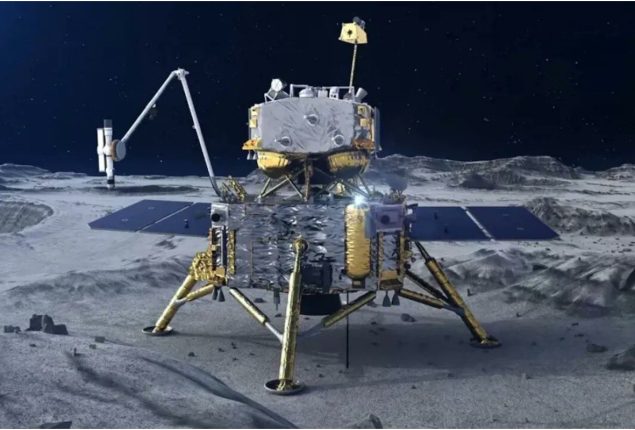China Tech giant strikes Euros deal with Beckham
The deal coincides with the start of the Euro football tournament in...

China claims that spacecraft successfully lands on moon’s far side
The China National Space Administration (CNSA) announced that its uncrewed craft, the Chang’e 6, successfully landed on the far side of the Moon. The spacecraft touched down in the South Pole-Aitken Basin at 06:23 Beijing time on Sunday morning (22:23 GMT Saturday). This marks a significant achievement, as the area is an unexplored region where almost no one attempts to go.
Launched on May 3, the mission aims to collect precious rock and soil from this region for the first time in history. The probe might extract some of the Moon’s oldest rocks from a huge crater on its South Pole.
The landing involved significant risks due to the difficulty of communicating with spacecraft on the far side of the Moon. China previously achieved this feat in 2019 by landing its Chang’e-4.
After launching from the Wenchang Space Launch Center, the Chang’e 6 spacecraft orbited the Moon while waiting to land. The lander component then separated from the orbiter and touched down on the side of the Moon that permanently faces away from Earth.
During the descent, an autonomous visual obstacle avoidance system automatically detected obstacles. A visible light camera selected a comparatively safe landing area based on the brightness and darkness of the lunar surface, according to the CNSA, as quoted by the state-run Xinhua news agency.
The lander hovered about 100 meters (328 feet) above the safe landing area and used a laser 3D scanner before slowly descending. The Queqiao-2 relay satellite supported the operation, according to the CNSA.
Chinese state media described the successful landing as an “historic moment.” The state broadcaster reported that “applause erupted at the Beijing Aerospace Flight Control Center” when the Chang’e landing craft touched down on the Moon early Sunday morning.
The lander should spend up to three days gathering materials from the surface. The CNSA stated that this operation involves “many engineering innovations, high risks, and great difficulty.”
“Everyone is very excited that we might get a look at these rocks no one has ever seen before,” explains Professor John Pernet-Fisher, a lunar geology specialist at the University of Manchester. He has analyzed lunar rock brought back by the American Apollo missions and previous Chinese missions.
However, he suggests that the opportunity to analyze rock from a completely different area of the Moon could answer fundamental questions about how planets form. Most of the rocks collected so far resemble volcanic material found in places like Iceland or Hawaii. However, the material on the far side would possess a different chemistry. “It would help us answer those huge questions, like how planets are formed, why crusts form, and what the origin of water in the solar system is,” says the professor.
According to the CNSA, the mission aims to collect about 2kg (4.4lb) of material using a drill and mechanical arm. The South Pole–Aitken basin, an impact crater, ranks among the largest known in the solar system. From there, the probe could gather material from deep within the lunar mantle – the Moon’s inner core – as stated by Prof Pernet-Fisher. The Moon’s South Pole represents the next frontier in lunar missions – countries are eager to understand the region due to the high likelihood of containing ice.
Catch all the Sci-Tech News, Breaking News Event and Latest News Updates on The BOL News
Download The BOL News App to get the Daily News Update & Follow us on Google News.